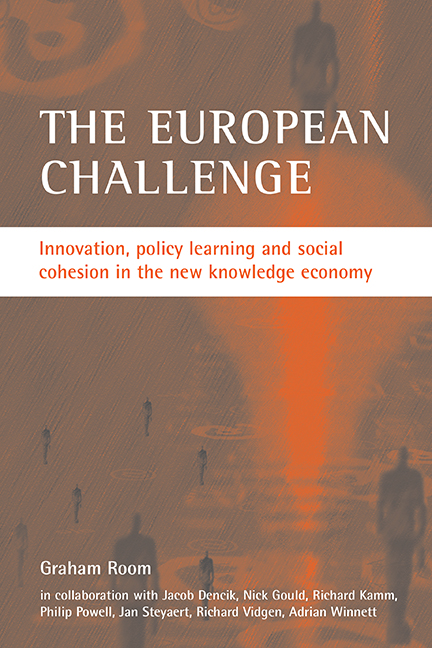Book contents
- Frontmatter
- Contents
- List of figures and tables
- Preface
- one The new knowledge-based economy
- two The EU response
- three Growth and stability
- four Dynamics and innovation
- five Enterprise and organisational change
- six Human investment and learning
- seven Social cohesion and inclusion
- eight Models and measurement
- nine Benchmarking and governance
- ten Globalisation and the knowledge economy
- Endnotes
- References
- Index
seven - Social cohesion and inclusion
Published online by Cambridge University Press: 18 January 2022
- Frontmatter
- Contents
- List of figures and tables
- Preface
- one The new knowledge-based economy
- two The EU response
- three Growth and stability
- four Dynamics and innovation
- five Enterprise and organisational change
- six Human investment and learning
- seven Social cohesion and inclusion
- eight Models and measurement
- nine Benchmarking and governance
- ten Globalisation and the knowledge economy
- Endnotes
- References
- Index
Summary
Introduction
Successive waves of technological innovation generate hopes of a ‘social dividend’ and an improved quality of life. The telegraph was welcomed in the 19th century because “technology supports a kinship of humanity” (Scientific American 1881, quoted in Fischer, 1992); some decades later the radio was welcomed, as “making us feel together, think together, live together” (Marvin, 1989). Similar hopes have been raised by the spread of ICT: personal computers, the internet and mobile phones could promote social inclusion, increasing educational and labour market opportunities and enriching social networks.
The “social dividend of technology” has been on the European policy agenda ever since Padraig Flynn, EU Commissioner for Employment and Social Affairs, established the High Level Group of Experts in May 1995 to examine the social changes associated with the Information Society (Steyaert, 2002). At the same time, policy makers have recognised that technology also produces risks and that innovation carries a fundamental ambiguity:
• “The Information Society promises new digital opportunities for the inclusion of socially disadvantaged people and less-favoured areas. Information and communication technologies have the potential to overcome traditional barriers to mobility and geographic distance, and to distribute more equally knowledge resources.
• On the other hand new risks of ‘digital exclusion’ need to be prevented. In a society increasingly dominated by the usage of information technologies across all sectors, internet access and digital literacy are a must for maintaining employability and adaptability, and for taking economic and social advantage of online contents and services.” (European Commission, 2001c, p 4)
The eEurope initiative aims to ensure that the transition to an information society is socially inclusive, builds trust and strengthens social cohesion. This resonates with the Lisbon Strategy and the Nice European Council (December 2000), which identified e-inclusion as a key objective within efforts to combat poverty and social exclusion. In October 2001 the Council adopted a resolution on e-inclusion (European Commission, 2001c; European Council, 2001). More focused policy statements include the Ministerial Declaration of April 2003 Towards an Inclusive Information Society in Europe (European Council, 2003). A similar set of ambitions in relation to the social benefits of technology can be found in global policy forums, such as the United Nations Development Programme, whose Human Development Report of 2001 carried the subtitle Making new technologies work for human development.
- Type
- Chapter
- Information
- The European ChallengeInnovation, Policy Learning and Social Cohesion in the New Knowledge Economy, pp. 107 - 134Publisher: Bristol University PressPrint publication year: 2005



